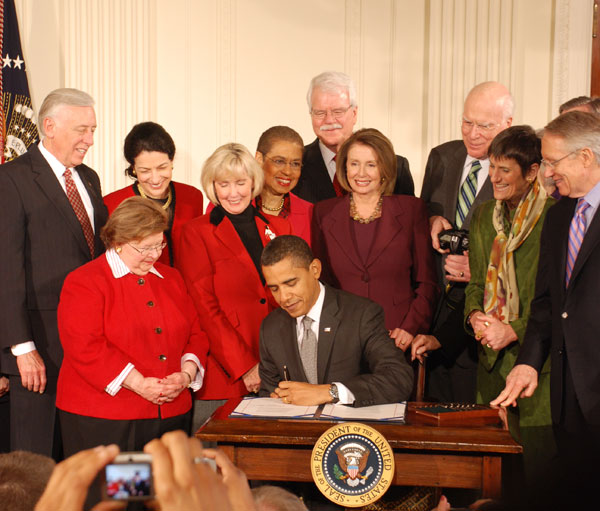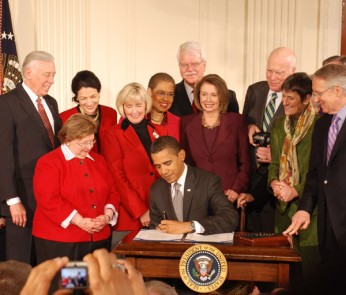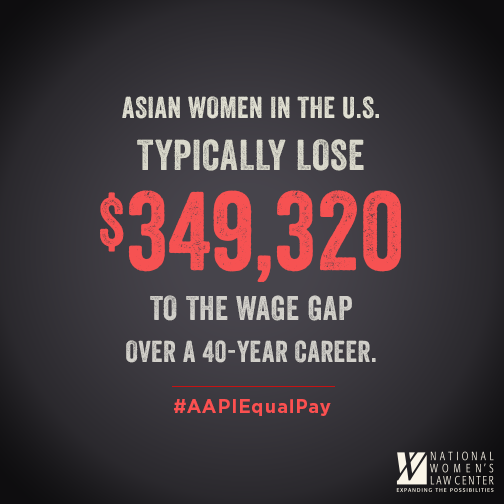Abortion rights, women of color, and LGBTQI+ people are under attack. Pledge to join us in fighting for gender justice.
States Lead Better on Ledbetter Anniversary

Today marks the seventh anniversary of the signing of the Lilly Ledbetter Fair Pay Act—the first piece of legislation President Obama signed into law and an important victory for women seeking to challenge pay discrimination in court. And we need all the tools we can get, as more than fifty years after the Equal Pay Act was passed prohibiting pay discrimination, women working full time, year round still make just 79 cents for every dollar paid to men. The situation is even worse for women of color—African American women are typically paid just 60 cents on every dollar paid to white, non-Hispanic men, and Hispanic women are paid only 55 cents.
 Fortunately, states have increasingly been stepping up as leaders in the fight to strengthen equal pay laws to close the wage gap. In 2015 alone, seven new states passed legislation strengthening their equal pay laws. Of particular note, California enacted the strongest equal pay legislation in the country. California’s new law prohibits employers from retaliating against employees for discussing their or other employees’ pay, or encouraging other employees to exercise this right. It also requires equal pay for “substantially similar” work and tightens the law to ensure that only job-related reasons consistent with business necessity can justify pay discrimination. Connecticut, New York, and Oregon also passed anti-pay secrecy provisions in 2015 and New York also tightened its employer defenses to close court-created loopholes.
Fortunately, states have increasingly been stepping up as leaders in the fight to strengthen equal pay laws to close the wage gap. In 2015 alone, seven new states passed legislation strengthening their equal pay laws. Of particular note, California enacted the strongest equal pay legislation in the country. California’s new law prohibits employers from retaliating against employees for discussing their or other employees’ pay, or encouraging other employees to exercise this right. It also requires equal pay for “substantially similar” work and tightens the law to ensure that only job-related reasons consistent with business necessity can justify pay discrimination. Connecticut, New York, and Oregon also passed anti-pay secrecy provisions in 2015 and New York also tightened its employer defenses to close court-created loopholes.
2016 promises to be an even stronger year. This week, state legislators and advocates around the country have been engaging in a week of action to draw attention to the persistent wage gap and highlight new proposals that could help close the gap. Riding the momentum from 2015, twenty-nine (29!) states have introduced equal pay bills during their current legislative sessions or are expected to introduce one soon. The policy proposals percolating in the states are exciting and myriad, from requiring that women be paid the same as men when their jobs are largely the same to tackling occupational segregation to increasing enforcement, employer penalties, and victim compensation. An exciting bill in Massachusetts—which unanimously passed the Massachusetts Senate yesterday—includes provisions that prevent employers from asking about salary history prior to extending an offer of employment, thus helping ensure that pay discrimination does not follow women from job to job. The Massachusetts bill also encourages employers to conduct self-evaluations of their pay practices.
Clearly, state lawmakers are increasingly realizing that equal pay makes sense as a matter of policy and politics. In terms of fighting pay discrimination and the wage gap, it is clear that states simply lead better on this seventh Ledbetter anniversary.





